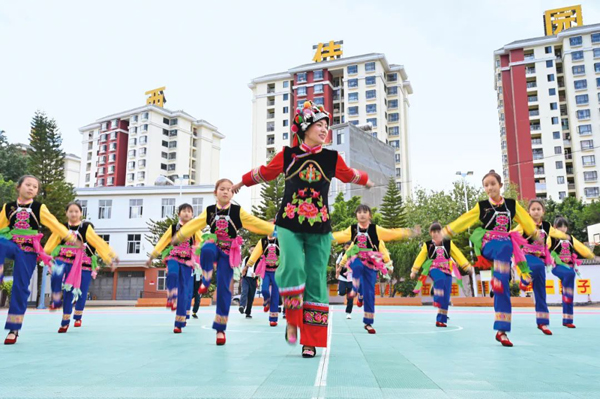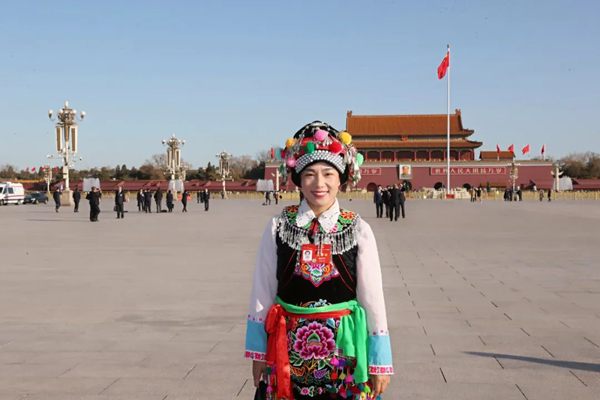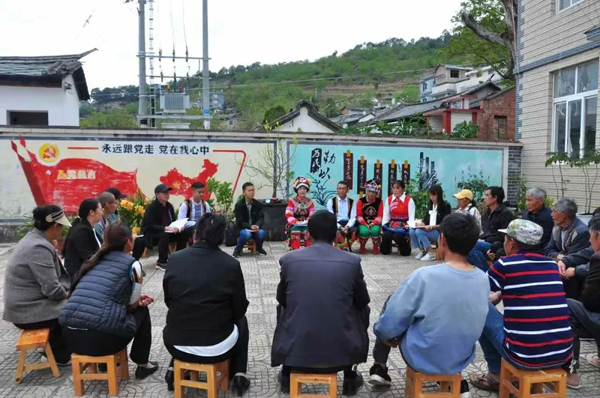Deputy from ethnic village dances to rural vitalization
Lu Lihua, a member of the Yi ethnic group from Nanjian Yi autonomous county in Dali Bai autonomous prefecture, Southwest China's Yunnan province, has spent over 13 years in the preservation and development of ethnic culture, as her hometown is a trove of Yi songs and dances.
Hailing from a rural background, Lu, 36, learned from her elders folk songs and dances listed as a national-level intangible cultural heritage, including dage, a traditional form of folk song, and tiaocai, a ceremonial dance form based on serving food.

File photo: In May 2024, Lu Lihua (center), a deputy to the National People's Congress and an inheritor of the intangible cultural heritage, visits a primary school in Nanjian Yi autonomous county, Southwest China's Yunnan province, to carry out the campaign of promoting intangible cultural heritages on campus. [Photo provided to npc.gov.cn]
In order to improve community livelihoods, she made up her mind to bring the essence of Yi ethnic songs and dances to rural households and draw a bigger audience to this folk art.
"I have always aspired to sing well and dance gracefully, so more people can witness the pure and ancient folk customs of our hometown," Lu said. Influenced by her elders, Lu has dedicated herself to mastering dage and tiaocai. Through innovative choreography and program design, she revitalized the once declining traditional tiaocai at banquets into stage performances.
"We are quite popular for village celebrations, commercial events, and performances at scenic spots. Our performance schedule for the next three months has been booked up already," she said.
The fervor of villagers participating in dance performances has brought more vigor to their lives as employment opportunities arise, and the fusion of ethnic charm and local resources in performances like tiaocai is gradually evolving into a distinctive industry.
In recent years, with the growth of the tourism industry and heightened interest in local cultural heritage, an increasing number of restaurants and rural homestays have embraced tiaocai performances.
Currently, Nanjian boasts over 300 folk dance troupes and more than 2,000 performers. Through the integration with industries such as catering, wedding services, and tourism, tiaocai performances have directly or indirectly facilitated employment for tens of thousands of locals.
Meanwhile, challenges emerge as the tiaocai performance industry expands, including short performance seasons, unstable income and a scarcity of young performers.
In 2023, Lu was elected as a deputy to the 14th National People's Congress (NPC). Since then, she has felt a more profound sense of responsibility and commitment. In order to fulfill her duty, she has tirelessly carried out research and exploration, traveling to numerous villages, gaining new insights into the preservation and inheritance of Yi ethnic dance.
"The key to the growth of local cultural industry lies in retaining young people through stable markets and well-established mechanisms," she noted.

File photo: Lu Lihua, a deputy to the National People's Congress (NPC), poses for a photo when she attends the second session of the 14th NPC in March 2024. [Photo provided to npc.gov.cn]
Lu said that tapping into the charm of traditional culture from the perspective of young people and continuously integrating and innovating traditional and modern cultures, outstanding traditional culture can be better preserved and developed. And it can eventually become a thriving industry that contributes to local employment and income increase.
During the first session of the 14th NPC, Lu submitted suggestions on enhancing support for the development of ethnic culture and strengthening related infrastructure construction. As an NPC deputy, she aims to rally more support for the preservation and promotion of ethnic culture to foster their prosperity and development.

Lu Lihua, a deputy to the National People's Congress (NPC), promotes the guiding principles of the second session of the 14th NPC to her fellow villagers. [Photo provided to npc.gov.cn]
Deeply aware of the vital role of intangible cultural heritages in rural vitalization, Lu plans to continue initiatives such as introducing them to schools and communities, conducting traditional dance and song performances in villages, and passing on traditions to grassroots artists and enthusiasts. Looking ahead, she envisions expanding the performance market and developing cultural products to help locals achieve prosperity.
Li Qianwen contributed to this story.
- China's top legislator holds talks with speaker of Zambia's National Assembly
- China's top legislator meets Finnish president
- Lawmakers to meet early next month to deliberate draft laws, reports
- Senior Chinese legislator meets Ethiopian guests in Beijing
- Senior legislator solicits opinions on revisions to education laws



